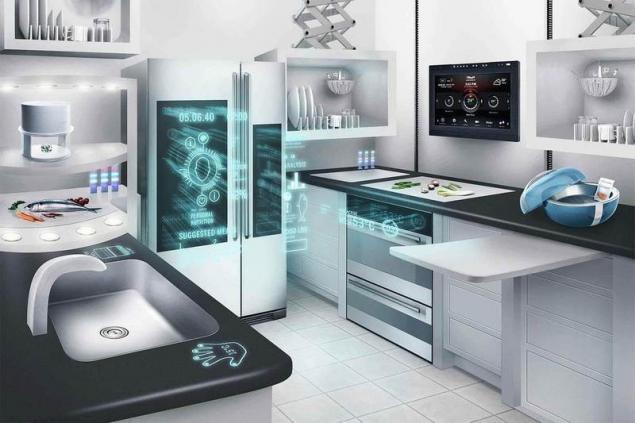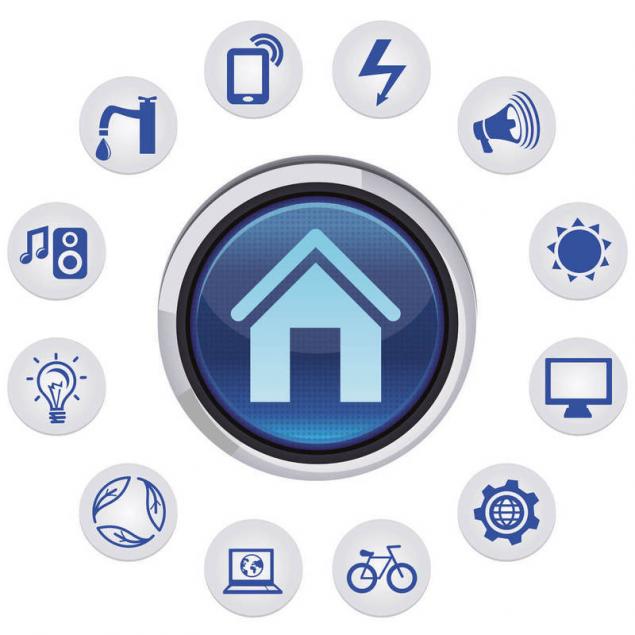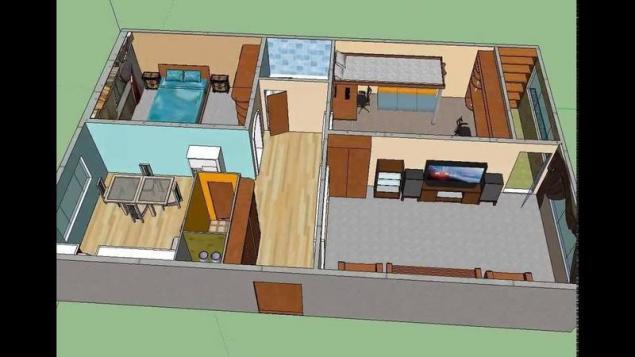748
Designing smart homes
smart home technology is designed to provide automatic and coordinated operation of all life-support systems and safety. It detects changes in the environment and indoors, responding to them appropriately both on user instructions, and independently.
The main feature of this technology is to combine the individual subsystems and devices into a single system controlled by means of automation.
Modern apartment, apartments, cottages, country houses is a complex engineering complex. Smart House is able to take over management of energy supply concerns, heating systems, plumbing, ventilation and air conditioning.

To the owner could derive maximum benefit from the use of such systems, their work should be coordinated. Thus, the battery will not be aimlessly heat the room with the windows open, and wireless technology will allow customers to immediately identify any abnormal situation wherever he was.
Smart Home Technology recently attracted a growing number of people who appreciate the comfort and modern technical solutions. However, it should be noted that the arrangement of a smart home - a crucial step, and the end result largely depends on how well were trained to the selection, installation and commissioning of all systems
. One of the ways to create a smart home are DIY-solutions, where the user collects and connects intelligent devices. Typically, these solutions are available "out of the box", and they do not require adjustment.
But more interesting are professional systems, which are called Custom Install - their installation and setup takes a professional company, moreover, such decisions often draft agreement at the stage of building a house
. Smart House was originally should not be designed as a standalone system. It is necessary to foresee the ways of its interaction with higher level systems, eg building management systems, emergency systems and accounting systems of resources and delivery of content. It turns out that it is necessary immediately to lay the ability to interact with the outside world, in order to provide high quality services provided by the user.
That is why the design of smart home system is just as important as the design of the building in which it is installed. Of course, in case of an error the effects will not be fatal, but recurrent shortcomings in the work of air conditioners on and off the water supply due to improperly installed sensor leaks will not allow to fully enjoy the location.
To prevent possible problems can be only one way: to draft. Undoubtedly, there is a possibility that during the time of the creation of the drawing before the introduction of home into service additional requests may appear from the owners, so a competent plan should always have the potential for some expansion of the system, so as not to have to "shovel" all that has been done.
Ideally, the design of smart home system should begin simultaneously with the design of the building (or apartment) because in this system involved a fairly large number of electrical and signal cables, and hide them under the plaster will not work.
In addition, it is necessary not only to provide space for the equipment, which definitely need ventilation, but also the hidden hatches for access to the cable routes at key points. Thus, at an early stage of the design need to work together architect and design engineer.
The first step in this work is to create a conceptual design. In it all the tasks should be described to be performed by the system. This information is needed for the pre-selection of equipment features which, in turn, can affect the performance of the entire system.
Design of intelligent home control system is carried out based on consumer demands. The answer to every query is a device that performs a particular task. The set of such devices is the periphery of the smart home. The components of the system is the sensors that provide information about the status of the objects of the physical world, actuators, providing impact on the real world of objects according to the instructions.
There is also included a network of data collection and transmission of commands, receives data from the sensors and issuing commands to actuators, and storage that stores, for example, the state of the sensors and actuators.
Once the constituent parts of a smart home control system should include the client and intelligent core - a software system that is responsible for the work of intelligent devices
.
It is important to remember that one of the important issues is to ensure the connection of sensors and actuators with the core management system. The communication system must provide reliable identification of active devices have sufficient capacity, as well as support for easy integration of new devices.
To organize such a network in one of three ways: using wireless technology, to build a special cord or use the power cables. Wireless systems are of two types: fixed topology and mesh networks. The first option - it is a classic network, which is designed and deployed manually.
The second option is more promising and is a self-adjusting odnoranogovuyu based network protocol Z-Wave, ZigBee, Bluetooth, and others. As for wired systems, they are constructed on the basis of serial protocols, such as 1-wire. Their obvious disadvantage is the need for laying special cables.
After gathering all the necessary information about the system can be terms of reference for the design - it is the second stage. It is important that the customer at the time of compilation of TK already has an idea of the cost of the system and the functions it can perform.
After drawing up the terms of reference comes the third stage - the development of a detailed project that includes all of the documentation: a set of construction drawings, equipment specifications, schedule of work etc. Here alongside works installers, adjusters, architects, designers and other professionals.. that allows you to quickly take into account the wishes of the owners.

The result of a complete set of turns on the project documents for the installed system that meets the needs of the owners, and taking into account the specifics of a particular house or apartment. The client receives on his hands a detailed specification of equipment and functional diagrams and drawings, cable Journal, electrical diagrams and instrument cabinets and so on. D.
Today brings more and more benefits and convenience of our lives filled with technological advances everyday life of a modern person different innovations. We touch these technological innovations and life spheres.
The natural human desire to comfort the impetus for the development of high-tech systems with the help of which it became possible to centrally manage all equipment located in the building. Proper system design and use of technology allows you to fully enjoy the advantages possessed by smart house, and build their dream home.
The main feature of this technology is to combine the individual subsystems and devices into a single system controlled by means of automation.
Modern apartment, apartments, cottages, country houses is a complex engineering complex. Smart House is able to take over management of energy supply concerns, heating systems, plumbing, ventilation and air conditioning.

To the owner could derive maximum benefit from the use of such systems, their work should be coordinated. Thus, the battery will not be aimlessly heat the room with the windows open, and wireless technology will allow customers to immediately identify any abnormal situation wherever he was.
Smart Home Technology recently attracted a growing number of people who appreciate the comfort and modern technical solutions. However, it should be noted that the arrangement of a smart home - a crucial step, and the end result largely depends on how well were trained to the selection, installation and commissioning of all systems
. One of the ways to create a smart home are DIY-solutions, where the user collects and connects intelligent devices. Typically, these solutions are available "out of the box", and they do not require adjustment.
But more interesting are professional systems, which are called Custom Install - their installation and setup takes a professional company, moreover, such decisions often draft agreement at the stage of building a house
. Smart House was originally should not be designed as a standalone system. It is necessary to foresee the ways of its interaction with higher level systems, eg building management systems, emergency systems and accounting systems of resources and delivery of content. It turns out that it is necessary immediately to lay the ability to interact with the outside world, in order to provide high quality services provided by the user.
That is why the design of smart home system is just as important as the design of the building in which it is installed. Of course, in case of an error the effects will not be fatal, but recurrent shortcomings in the work of air conditioners on and off the water supply due to improperly installed sensor leaks will not allow to fully enjoy the location.
To prevent possible problems can be only one way: to draft. Undoubtedly, there is a possibility that during the time of the creation of the drawing before the introduction of home into service additional requests may appear from the owners, so a competent plan should always have the potential for some expansion of the system, so as not to have to "shovel" all that has been done.
Ideally, the design of smart home system should begin simultaneously with the design of the building (or apartment) because in this system involved a fairly large number of electrical and signal cables, and hide them under the plaster will not work.
In addition, it is necessary not only to provide space for the equipment, which definitely need ventilation, but also the hidden hatches for access to the cable routes at key points. Thus, at an early stage of the design need to work together architect and design engineer.
The first step in this work is to create a conceptual design. In it all the tasks should be described to be performed by the system. This information is needed for the pre-selection of equipment features which, in turn, can affect the performance of the entire system.
Design of intelligent home control system is carried out based on consumer demands. The answer to every query is a device that performs a particular task. The set of such devices is the periphery of the smart home. The components of the system is the sensors that provide information about the status of the objects of the physical world, actuators, providing impact on the real world of objects according to the instructions.
There is also included a network of data collection and transmission of commands, receives data from the sensors and issuing commands to actuators, and storage that stores, for example, the state of the sensors and actuators.
Once the constituent parts of a smart home control system should include the client and intelligent core - a software system that is responsible for the work of intelligent devices
.

It is important to remember that one of the important issues is to ensure the connection of sensors and actuators with the core management system. The communication system must provide reliable identification of active devices have sufficient capacity, as well as support for easy integration of new devices.
To organize such a network in one of three ways: using wireless technology, to build a special cord or use the power cables. Wireless systems are of two types: fixed topology and mesh networks. The first option - it is a classic network, which is designed and deployed manually.
The second option is more promising and is a self-adjusting odnoranogovuyu based network protocol Z-Wave, ZigBee, Bluetooth, and others. As for wired systems, they are constructed on the basis of serial protocols, such as 1-wire. Their obvious disadvantage is the need for laying special cables.
After gathering all the necessary information about the system can be terms of reference for the design - it is the second stage. It is important that the customer at the time of compilation of TK already has an idea of the cost of the system and the functions it can perform.
After drawing up the terms of reference comes the third stage - the development of a detailed project that includes all of the documentation: a set of construction drawings, equipment specifications, schedule of work etc. Here alongside works installers, adjusters, architects, designers and other professionals.. that allows you to quickly take into account the wishes of the owners.

The result of a complete set of turns on the project documents for the installed system that meets the needs of the owners, and taking into account the specifics of a particular house or apartment. The client receives on his hands a detailed specification of equipment and functional diagrams and drawings, cable Journal, electrical diagrams and instrument cabinets and so on. D.
Today brings more and more benefits and convenience of our lives filled with technological advances everyday life of a modern person different innovations. We touch these technological innovations and life spheres.
The natural human desire to comfort the impetus for the development of high-tech systems with the help of which it became possible to centrally manage all equipment located in the building. Proper system design and use of technology allows you to fully enjoy the advantages possessed by smart house, and build their dream home.
What prevents men and women to be happy together
Jean Baudrillard: The world in which it becomes more and more information and less sense























